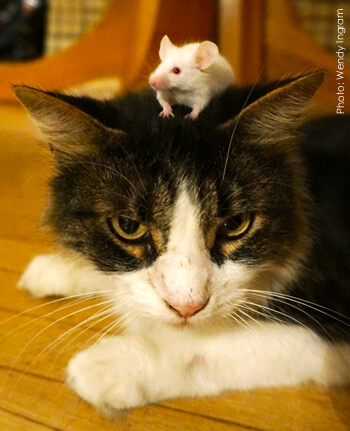New Study: Toxoplasma Infection May Make Mice Permanently Fearless of Cats
 |
(Washington, DC, October 2, 2013) A study just published in the online journal PLOS ONE by University of California graduate student Wendy Ingram has found that the bizarre impacts to mice from the Toxoplasma gondii parasite—which can cause spontaneous abortion in pregnant women or lead to death in immune-compromised patients—may be permanent.
Infected mice lose their fear of cats, which is good for both cats and the parasite, because the cat gets an easy meal and the parasite gets into the cat's intestinal tract, where it continues its cycle of infection in the only place it can sexually reproduce.
The link among cats, T. gondii, and humans is documented by several studies. According to one, up to 74 percent of cats will become infected with T. gondii during their lifetime, depending on the type of feeding and whether cats are kept indoors or allowed to roam outdoors. A 2011 study found that 63 percent of human patients with acute toxoplasmosis had become infected through cat feces.
Ingram said other studies have found that one-third of the world's human population has been infected by T. gondii and probably have dormant cysts in their brains. Kept in check by the body's immune system, these cysts sometimes revive in immune-compromised people, leading to death. Some preliminary studies suggest that chronic infection may be linked to schizophrenia or suicidal behavior.
The fearless behavior in mice persists long after the mouse recovers from the flu-like symptoms of toxoplasmosis and at least four months after the parasitic infection is cleared from the body, according to the study.
“Even when the parasite is no longer in the brains of the animals, some kind of permanent long-term behavior change has occurred, even though we don't know what the actual mechanism is,” said Ingram. She speculated that the parasite could damage the smell center of the brain so that the odor of cat urine, which in healthy mice acts as a repellant, can't be detected. The parasite could also directly alter neurons involved in memory and learning, or it could trigger a damaging host response, as in many human autoimmune diseases.
The study follows closely on the heels of several additional studies detailing the public health consequences of outdoor cats. A study from scientists at the Stanley Medical Research Institute and Johns Hopkins University said that “because cats are now so ubiquitous in the environment, one may become infected [ with toxoplasmosis ] by neighboring cats which defecate in one's garden or play area, or by playing in public areas such as parks or school grounds.” The authors went on to say that prevention should include public education, keeping cats indoors, and minimizing the feral cat population.
A study published by scientists from the Centers for Disease Control and Prevention, American Bird Conservancy (ABC), and the U.S. Department of Agriculture focused on the rabies threat posed by feral cats, stating that “… maintaining adequate rabies vaccination coverage in feral cat populations is impractical, if not impossible. Therefore, these populations [of feral cats] must be reduced and eliminated to manage the public health risk of rabies transmission.”
“The implications to human health from tens of millions of feral cats are serious and getting worse every day,” said Darin Schroeder, Vice President for Conservation Advocacy for ABC. "Local decision-makers have got to start dealing with this instead of acquiescing to emotional pleas from cat advocates whose sole concern is the long-term survival of each and every feral cat, no matter the impacts to affected people and communities.”
Ingram became interested in T. gondii after reading about its behavior-altering effects in mice and rats and possible implications for its common host, the domestic cat, and even humans. Pregnant women are already warned to steer clear of kitty litter, since the parasite is passed through cat feces and can cause blindness or death in the fetus. Another main source of transmission is undercooked pork, Ingram said.
With the help of Michael Eisen and Ellen Robey, University of California-Berkeley professors of molecular and cell biology, Ingram set out three years ago to discover how T. gondii affects mice's hard-wired fear of cats. She tested mice by seeing whether they avoided bobcat urine, which is normal behavior, versus rabbit urine, to which mice don't react. While earlier studies showed that mice lose their fear of bobcat urine for a few weeks after infection, Ingram showed that the three most common strains of T. gondii make mice less fearful of cats for at least four months.
Using a genetically altered strain of T. gondii that cannot form cysts and thus is unable to cause chronic infections in the brain, she demonstrated that the effect persisted for four months even after the mice completely cleared the microbe from their bodies. She is now looking at how the mouse immune system attacks the parasite to see whether the host's response to the infection is the culprit.
"The idea that this parasite has the ability to exert desired change in complicated rodent behavior is absolutely remarkable," Ingram said. "Toxoplasma gondii has done a stunning job of adapting to mammalian brains in order to enhance its transmission through a complicated life cycle."


















































